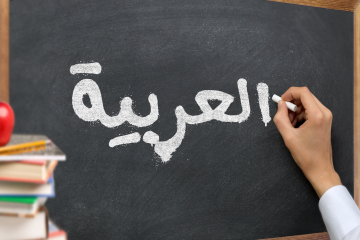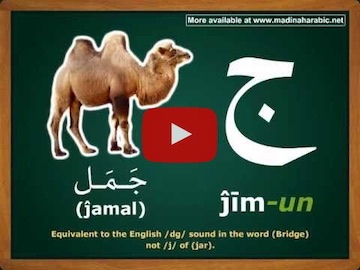How to Learn Arabic

Before we dive into how to learn Arabic, let’s discuss the brief history of Arabic and find out just how old the Arabic language is.
Arabic is one of the Semitic languages. It has been spoken in the Arab world for more than 20 centuries.
The noun "Arabic" is related to the ethnic group inhabiting Arabian Peninsula, North Africa, Gulf, Western Asia, and Western Indian ocean. “Arab” is derived from an ancient person called "Ya'rub", the ancestor of the "pure Arabs".
Islam has preserved Arabic language for over 14 centuries through the Holy book known as the "Quran" and contains all Arabic linguistic sources serving it.
Today, there are two main forms of Arabic;
Standard Arabic: The official language of Arab states, literature, books, instruction, etc.
The second form is the spoken regional dialects which differ from one region to another.
Language or Deen?
The Arabic word "Deen - دِين" is defined as religion. It refers to Islam, which is one of the major religions in the world today. Islam means submission to "Allah - الله" "the one incomparable Lord." Islam is followed by 1.9 billion people worldwide. However, only 422 million of these followers are native Arabic speakers.
Most non-Arab Muslims have a desire to learn (MSA) Modern Standard Arabic. This is because they want to perform prayers, read and understand the Qur'an, and understand more about Islam.
It's also important to note that MSA is required for those who want to learn Tajweed (Quranic recitation) to read the Quran properly.
Which Arabic Dialect to Learn
When searching for ways on how to learn Arabic, there is a second option. That alternative is to choose one of the colloquial spoken Arabic dialects that best suits your needs. There are four main dialects (daily spoken languages). These dialects are: Gulf, Levantine, Egyptian, and Moroccan Arabic. Each dialect is slightly different from one another.
The basics of Arabic grammar in dialects are straightforward. However, Arabic reading and writing is not available in colloquial dialects. It's only available in MSA.
Importantly, the MSA is best for those just starting out. It's the go-to for those with a desire to learn. That's because MSA is the one that can be understood by all Arabic people.
Modern Standard Arabic
Most Arabic learners decide to learn Modern Standard Arabic, as it is the main official Arabic, the language of the religion, the written language, the language of Arabic culture, literature, instruction, etc. It is also understandable from most Arabs in all countries.
Learning MSA helps you communicate with most Arabs (even if they are not good enough in Standard Arabic). It also enables you to read and write, to study in Arabic, read and understand classic or modern books. It encompasses Arabic basics that are useful and set you in the right direction.
MSA is suitable for students, researchers, journalists, politicians, readers, and mass-media workers.
If you want to learn Modern Arabic, you can enjoy a free lesson today.
Spoken Arabic
One of the most important goals of MSA education is to learn how to speak Arabic.
Although daily Arabic is more related to colloquial dialects, you can also learn Arabic speaking in MSA.
Spoken MSA helps you to practice Fus-ha Arabic which is the official language of study and instruction. The Spoken Arabic course also helps you to learn how to read and write in MSA.
The Spoken Arabic course is suitable for people who want to learn Arabic for religion, politics, or studying at the university.
If you want to learn Spoken Arabic, you can have a free lesson.
Business Arabic
In the Arabic language course relating to MSA, there is a sub-option to learn business Arabic.
Business Arabic helps you to contact Arabic partners in different fields of commerce, make a business trip to an Arabic country, check in the airport and hotel, know the most common terms of trade, top negotiation phrases, etc. You can also read and write Arabic advertising posts.
The course is suitable for people who want to learn to speak Arabic and who work in import/export or manufacturing in Arab countries.
If you want to learn Business Arabic, you can enjoy a free lesson.
Tajweed
When thinking about the best route to take on how to learn Arabic, learning Tajweed (Quran recitation) can have fruitful results in Arabic pronunciation. The rules of Tajweed are almost the same rules of Arabic phonology.
The main benefit of Tajweed is being able to read the Holy Quran properly. In addition, there are some other benefits for those who study Arabic academically and face difficulties with Arabic phonology. It also improves pronunciation skills.
Tajweed is important for all Muslims if they wish to avoid misreading the Quran.
If you want to learn Tajweed, you can enjoy a free lesson.
Quranic Arabic
The term of Quranic Arabic may mean the Arabic relating to the Ayahs (verses) of Quran. It also means Arabic for Islam, i.e. learning a form of language that helps Muslims understand the language and use it in their daily life as practitioners of Islam. This includes being able to provide general linguistic tips for all.
With a Quranic Arabic course, you can learn Arabic as it relates to performing prayers and Ramadan fasting. Not to mention, it can help you attain the more common language skills.
Therefore, this would be suitable for someone who lives in, or is perhaps moving to an Islamic environment.
If you want to learn Quranic Arabic, here's a free lesson.
How Hard Is It to Learn Arabic
Although Arabic is a highly expressive language, it’s also a stenographic language (hiding many things like short vowels, for instance). Also, it’s written from right to left. Therefore, Arabic is a bit tougher to learn.
In order to learn Arabic properly, you have to spend about 2,400 hours of Arabic classes that last over 85 weeks. This doesn't include practice time, reading and speaking skills. Some linguists consider Arabic just as tough to learn as Korean and Chinese, while the U.S. State Department classifies Arabic as a critical language.
How to Learn Arabic: 5 Techniques
Tutoring Lessons
If you don’t have the right budget for learning Arabic, there's hope. We will show you some different options that allow you to take advantage of free online Arabic lessons (free Arabic lessons offered by Madinah Arabic).
First, let's discuss one of the more effective options that involves finding a personal tutor. This option has several advantages:
- Lessons may take place online or off.
- One-on-one lessons are the best choice for someone who works better with individualized lesson plans.
- It's also a wonderful option for those who seek to become fluent in speaking Arabic.
- Best for those who are limited on funds, but wish to learn Arabic.
- The right tutor can practice with you and help to correct your pronunciation errors.
You can get a free lesson with an Arabic tutor online!
Online Courses
Now, let's discuss the other alternative for those who don’t have the budget to learn Arabic. A free Arabic course online can provide effective self-learning material (Madinah Arabic has a complete Arabic language course that incorporates visuals and audio so you can effectively learn the Arabic language).
The advantages of this option are as follows:
- Good for people who are on the go, or have a busy lifestyle.
- Offers a self-paced convenience, with flexibility that allows you to learn on your own time.
- Can learn from anywhere.
- No payment required.
But there are some disadvantages, as follows:
- No way to practice pronunciation and speaking skills (the main goal of learning process).
- No fixed timetable with milestones.
- No certificate obtained by regular study.
Engage your desire to learn this language with a free Arabic course online at our website.
Apps
One of the modern technical options is choosing an interactive app to learn Arabic. There are many online apps that could help you learn Arabic.
Advantages of this option:
- Very convenient.
- Flexibility as apps are available to use at your own leisure.
- Most are available at a low cost and some are offered for free.
- Can learn from anywhere (from the comfort of your own couch, or on the go).
- Good for people with busy lifestyles.
Disadvantages:
- Could be difficult for some users to navigate.
- Apps typically won't work without a data or wifi connection.
- Not a good option for those who wish to become fluent in Arabic.
- Not a good option to practice speaking the language, this option caters more to writing in Arabic. This is typically the main goal of learning a new language. When it comes to developing this skill, there is no guidance in regards to pronunciation. This means that errors with correct speech will not be properly corrected. This can only be achieved with a tutor.
- Not suitable for those who are learning Arabic in order to receive certificates, milestones, or if they're looking for a way to learn while incorporating this option into their course of study and/or college programs.
Class
Learning Arabic from an institute, a college, or technical school would be an appropriate option for young students and for those who have available time to study in a class setting style Arabic language course.
Advantages:
- Most likely to achieve learning goals within a certain amount of class time.
- It includes milestones to ensure your continuous progress.
- Programs are mostly by professional specialized experts.
- Professional teachers that will allow you to practice Arabic much more often.
Disadvantages:
- No flexibility for scheduled class times.
- Could conflict with your work schedule or family time.
- It's a costly investment.
Best Way to Learn Arabic with Madinah
Learning Arabic with a tutor from Madinah Arabic guarantees many of the above mentioned advantage points. It’s the best way to learn Arabic online, because:
- Flexibility, you decide when to start, you set your learning pace.
- Developing all the right skills and practicing them with a native tutor.
- Unique, customized courses designed to help you succeed in understanding the Arabic language by:
- Speak Arabic
- MSA – complete
- Quranic Arabic
- Business Arabic
- Tajweed
You can enhance your knowledge on the Arabic language with a free lesson with an Arabic tutor online!
Take advantage of a free Arabic course online at our website.
Is Learning Arabic Worth It?
Yes, learning Arabic can be beneficial for many reasons. Here are some of the main reasons you should invest in learning Arabic:
- It’s spoken by more than 442 million people.
- There are 22 countries with Arabic as their first language.
- It could help you acquire new friendships or find the career you're searching for in many countries.
- Learning Arabic can help you understand religion (Islam) better
- Arabic is worth learning. It is the fifth most spoken language in the world
- One of the world’s surviving old languages
Most Arab countries offer the advantage of a good market for modern technology. Not to mention, these countries contain huge amounts of petroleum and many other natural resources. This makes the Arab language perfect to learn for those looking to trade those resources.
The Fundamentals of Learning Arabic
Let's talk about the idea of Arabic basics.
The first step is to learn the Arabic alphabet; This means you must understand exactly how to produce the sounds of each letter and practice them.
In the following video, the name of the letter is pronounced first, and then the sound that the letter represents.
You can also check out this detailed Arabic Alphabet reading course with audio and language exercises.
After that, you can be on your way to learning how to read some basic words and sentences in Arabic.
Watch the video below for more!
Learn Arabic Alphabet by Madinah Arabic

Learn Arabic Alphabet video teaches you how each Arabic letter is written and pronounced along with an illustration of a word using that letter and guides on pronunciation.
Common Arabic Words and Phrases
Basic Arabic Phrases
If you're ready to check out some of the basics of Arabic language in English, take a look below.:
English: What’s your name?
Arabic: مَا اسْمُك؟
Sound: Ma smuk?
My name is ______. = اسْمِي هُو - Esmī huwa
How are you? = كَيْفَ حَالُك؟ – Kayfa ħāluk
I’m fine = أَنَا بِخَيْر - Anā bikhayr
Please = مِنْ فَضْلِك - min Fađlik
Thank you = شُكْرًا لَك - Shukran lak
You’re welcome = عَفْوًا – ʿafwan
I’m sorry = أَنَا آسِف - `anā `āsif (M)/ `anā `āsifah (F)
Where is the bathroom? = أَيْنَ الْحَمَّام؟ – `ayna l ħammām?
Where is the service station? = أَيْنَ مَحَطَّةُ الْخِدْمَة؟ – `ayna Maħatat ul khidmah?
Help! = مُسَاعَدَة! – Mosāʿadah!
I don’t speak Arabic = أَنَا لَا أَتَكَلَّمُ الْعَرَبِيَّة - `anā lā atakallamu l ʿarabiyyah.
Could you speak slower, please? = هل يمكنك التحدث أبطأ من فضلك؟ – hal yumkinuk attaħadduth `abta` min fađlik?
How do you say____ in Arabic? = كَيْفَ تَقُول ______ بِالْعَرَبِيَّة؟ – Kayfa Taqūl ______ Belʿarabiyyah?
This is just the start of Arabic basics, but with Madinah Arabic, you can explore this language to the fullest.
Common Arabic Greetings
Here are some common Arabic greetings:
English: May peace be upon you!
Arabic: السَّلَامُ عَلَيْكُم
Sound: assalāmu ʿalaykum
Same to you = وَعَلَيْكُمُ السَّلَام - ʿalaykumu ssalām
Good morning = صَبَاحُ الْخَيْر – ŝabāu l-khayr
Good afternoon = مَسَاءُ الْخَيْر – masā’u l-khayr
Good evening = مَسَاءُ الْخَيْر – masā’u l-khayr
Pleased to meet you! = سُرِرْتُ بِلِقَائِك – surirtu biliqâ`ik
Have a nice day = أَتَمَنَّى لَكَ يَوْمًا سَعِيدًا – ‘atamanā lakā yawman saʿīdan
Good bye = مَعَ السَّلَامَة – maʿa s-salāmah
Please, enter = تَفَضَّل – tafađđal
With pleasure = بِكُلِّ سُرُور – bikulli surūr
Formal Arabic Speech
The ancient Arabic language contains no formal pronouns. The language didn't contain them originally. Due to modern times, the MSA has adapted words that show respect to authoritative persons within modern times.
Here are some modern formal Arabic words that you can use to address a person in power, such as a professor, father, president, or other authoritative figure.
Your Honor = حضرتك – ħađratuk (to father, unknown person instead of “أنت - you”).
Your Honor = سيادتك – Siyadatuk (to managers, governors, etc.)
Your Excellency = فخامتك – fakhâmatuk (to presidents)
Your Highness = سموك – sumuwwuk (to princes in Saudi Arabia, UAE, etc.)
Your Majesty = جلالتكم – jalālatukum (to kings)
Workplace Phrases
Let's take a look at the phrases that relate to the working world that we can decipher when learning Arabic basics:
English: What do you do?
Arabic: مَاذَا تَعْمَل؟
Sound: Mādhā Taʿamal?
What is your profession? = مَا مِهْنَتُك؟ – Ma Mehnatuk
I work as a_______ = أَنَا أَعْمَلُ كَـ _____ – `anā aʿamalu Ka _____
Businessman = رَجُلُ أَعْمَال - Rajul aʿmāl
Doctor = طَبِيب - Tabeeb
Nurse = مُمَرِّض - Mumarriđ (M) / Mumarriđah (F)
Cook = يَطْبُخ - Yatbukh
Veterinarian = طًبِيب بَيْطَرِيّ - Tabeeb BayTariyy
Teacher = مُدَرِّس - Mudarris
Researcher = بَاحِث - bāħith
Store clerk = مُوَظَّف فِي مَتْجَر - Muwadhdhaf Fī Matjar
Driver = سَائِق - Sā`iq
Web developer = مُطَوِّر وِيب - Muŧawwir wib
I’m a freelancer = أَنَا أَعْمَل بِالْقِطْعَة - `anā `aʿmal bilqiŧʿah
I have my own business = لَدَيّ عَمَلِي الْخَاصّ - Ladayya ʿamali l-khâŝ
I’m looking for a job = أَنَا أَبْحَثُ عَنْ عَمَل - `anā abħathu ʿan ʿamal
Travel Arabic Phrases
You can teach yourself Arabic with practice and native tutors. You can begin by reading the dialogue below that could be useful if you were visiting one of the many countries that speak Arabic.
English : I’m lost
Arabic : أَنَا تَائِه.
Sound : `anā Tā`ih
Do you speak English? = هَلْ تَتَكَلَّم الإِنْجِلِيزِيَّة؟ – HalTatakallam ul- `injilīziyyah?
Where’s the_____? = أَيْنَ الْـ_____؟ – `ayna l _____?
Train station = مَحَطَّة الْقِطَار - Maħaŧatu l-qiŧâr
Bus station = مَحَطَّة البَاص- Maħaŧatu l-bâŝ
Bathroom = حَمَّام - ħamman
I can’t find______ = لَا أَجِد - Lā `ajid
My passport = جَوَاز سَفَري - Jawāz safarī
My hotel = فُنْدُقِي - Funduqī
My group = مَجْمُوعَتِي - Majmūʿatī
Does this bus go to______? = هَلْ تَذْهَبُ هَذِه الْحَافِلَة إِلَى______؟ – Hal tadhhab hādhihi l-ħafilatu `ilā
Can I use your phone? It’s an emergency = هَلْ يُمْكِنُنَي اسْتِخْدَامُ هَاتِفِك؟ إِنَّهَا حَالَة طَارِئَة - Hal Yumkinuni stikhdāmu Hātifik? Innahā ħalah ŧarī’ah
Police! = شُرْطَة! – Shurŧah!
"I want a ticket to ______, please. = أُرِيدُ تَذْكِرَةً إِلَى ______ مِنْ فَضْلِك. – UrīduTadhkarah `ilā ______ min fađlik.
How much does this cost? = كَمْ يُكَلِّفُ هَذَا؟ – Kam yukallif hādhā?
Can I use your Wifi? = هَلْ يُمْكِنُنِي اسْتِخْدَامُ شَبَكَةَ الواي فاي الْخَاصَة بِك؟ – Hal yumkinuni stikhdāmu shabakat Al Wifi Alkhāŝah bik?
Do you have any vegetarian dishes? = هَلْ لَدَيْكَ أَيْ أَطْبَاق نَبَاتِيَّة؟ – Hal ladayk `ayyu `aŧbāq nabātiyyah?
Can I have the bill, please? = الْفَاتُورَةِ مِنْ فَضْلِك – Alfātūrah min fađlik?
Learn Arabic Alphabet by Madinah Arabic

Learn Arabic Alphabet video teaches you how each Arabic letter is written and pronounced along with an illustration of a word using that letter and guides on pronunciation.
Food Arabic Phrases
Here are some Arabic words and phrases about food:
I’m allergic to______ = ______ عِنْدِي حَسَاسِيَة مِنْ – ʿindī ħasāsiyah
What’s your favourite fruit? = مَا فَاكِهَتُكَ الْمُفَضَّلَة؟ - mā fākihatuka l-mufađđalah
What would you like more; meat or chicken? = مَاذا تُحِبُّ أكْثَر؛ اللَّحْم أَمِ الدَّجَاج؟ - mādhā tuħibbu akthar allaħm ami ddajāj
Shrimp = جَمْبَرِيّ – jambariyy
Nuts = المُكَسَّرَات - almukassarât
Fish = سَمَكَة - samakah
Milk = حَلِيب - ħalīp
Wheat = قَمْح - Qamħ
Learn Arabic Alphabet by Madinah Arabic

Learn Arabic Alphabet video teaches you how each Arabic letter is written and pronounced along with an illustration of a word using that letter and guides on pronunciation.
Arabic Love Phrases
Arabic language basics also include words fueled with love and passion. Take a look at the loving side of Arabic phrases below:
English: I love you!
Arabic: أُحِبُّك
Sound: `uħibbuk
I miss you = أَفْتَقِدُك - Aftaqiduk
I love you forever. = أُحِبُّكَ إِلَى الْأَبَد - `uħibbuka `ila l-`abad
My life is nothing without you! = حَيَاتِي بِدُونِكِ لَا شَيء - ħayātī bidūniki lā shay`
I’m crazy about you! = أَنَا مُتَيَّمٌ بِك - `anā mutayyam-un bik
My heart is falling in love with you. = لَقَدْ وَقَعَ قَلْبِي فِي غَرَامِك - Laqad waqaʿa qalbī fī gharāmik
I wish to spend my life with you. = عَسَى أَنْ أَعِيشَ الْعُمْرَ مَعَك - ʿasā `an `aʿīsha l-ʿumra maʿak
You make my heart skip a beat. = لِأَجْلِكِ قَلْبِي يَضْطَرِب - Li`aǰliki qalbī yađŧarib
How to Learn Arabic Fast
Here are some important tips that could help you understand and learn Arabic quickly and effectively:
- Start by learning easy words (try out some of the phrases that we listed above).
- Look at the word and write it down. Do this with every new word you learn (repetitive practice makes perfect).
- Try to learn words in sentences; this can help you on your journey of learning Arabic immensely.
- To get a feel for the accent and attain fluency, try listening to Arabic songs, audio, or news. This will enable you to hear the pitch and frequency to speak Arabic properly.
- Never stop practicing it.
- If you know someone that speaks Arabic fluently, you can practice speaking with them. Alternatively, you can find someone online to help you.
- You can also learn by watching the educational video below. And if you're really wondering how to learn Arabic, Madinah Arabic is a great place to start.
If you like this content, don't forget to subscribe to Madinah and get exclusive notifications when we post new blogs or lessons to help you learn Arabic, the best way.
Learn Arabic Alphabet by Madinah Arabic

Learn Arabic Alphabet video teaches you how each Arabic letter is written and pronounced along with an illustration of a word using that letter and guides on pronunciation.

